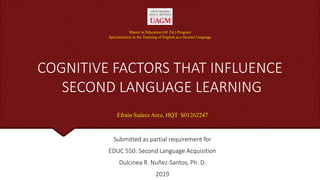
Suarez educ550 cognitive factors
- 1. COGNITIVE FACTORS THAT INFLUENCE SECOND LANGUAGE LEARNING Submitted as partial requirement for EDUC 550: Second Language Acquisition Dulcinea R. Nuñez-Santos, Ph. D. 2019 Master in Education (M. Ed.) Program Specialization in the Teaching of English as a Second Language Efrain Suárez Arce, HQT S01262247
- 2. INTRODUCTION When learning a second language, some students progress rapidly while others struggle and make slower progress. Some learners never quite achieve complete command of a second language. There are some individual characteristics that make some learners more successful than others. Our aim is to discuss these internal characteristics and perhaps see which of these seems most likely to be associated with success in second language learning.
- 3. INDIVIDUAL DIFFERENCES Social psychologists have argued that individual differences between learners is the most common factor that effect development of language. Even when following a common developmental route the degree of success learners achieved by each learner is always different from each other, and this is due to differences in each individual.
- 4. LANGUAGE LEARNING FACTORS There are a number of factors that influence someone's success at mastering a new language. Internal factors that affect the learning of a second language are those which stem from the learner's own mind. Some students learn a new language more quickly and easily than others. Clearly, some language learners are successful by sheer determination, hard work and persistence.
- 5. HOWEVER… However there are other factors that influence success that are mostly beyond the control of the learner. These factors can be broadly categorized as internal and external. It is the interplay between these two factors that determines the speed and facility with which the new language is learned.
- 6. AFFECTIVE FACTORS • COGNITIVE FACTORS Gardner and Macintyre (1992, 1883) have divided these internal factors into two groups: AFFECTIVE FACTORS and COGNITIVE FACTORS.
- 7. AFFECTIVE FACTORS INCLUDE… the learner's attitude to the learning process Anxiety in language-learning personality Social and cultural attitudes such as gender roles and community views toward language learning Individual attitude towards the second language Individual Motivation towards learning a second language willingness to communicate.
- 8. COGNITIVE FACTORS • INTELLIGENCE • LANGUAGE APTITUDE • LANGUAGE LEARNING STRATEGIES
- 9. INTELLIGENCE Intelligence refers to mental abilities that are measured by an IQ test. Intelligence may be a strong factor when it comes to learning that involves language analysis and rules learning. On the other hand it may play a less important role in language learning that focuses more on communication and interaction. It is common observation that students with good intelligence are able to do well in second language learning at least in formal classrooms. It is important to keep in mind that intelligence is complex individual trait and a person may have many kinds of abilities and strengths.
- 10. APTITUDE FOR LANGUAGE LEARNING Aptitude refers to potential for achievements. Language aptitude is a very effective tool for second language learning, an aptitude test is designed to make a prediction about an individual future achievements.
- 11. APTITUDE Aptitude for language learning usually composed of four different types of activities: 1) The ability to identify and memorize new sounds. 2) The ability to understand function of particular words in sentences. 3) The ability to figure out grammatical rules from language samples. 4) The ability to memorize new words. Successful language learners are not necessarily strong in all of components of aptitude. Some learners may have a strong memory but only an average ability to figure out grammatical rules. Learners do not all share the same aptitudes (Harley and Hart, 1997).
- 12. LANGUAGE LEARNING STRATEGIES Strategies are the implications that we apply to learning, it has different levels. Those who are successful in second language learning have useful strategies, like: planning, monitoring, rehearsal, organization, etc. Learners who are highly motivated to learn a language will use a variety of strategies. The learner’s preference for learning, whether due to their learning styles or to their beliefs about how language are learned, will influence the kind of strategies or implications they choose to learn new material. The more proficient learners employ strategies that are different from those used by the less proficient.
- 13. IMPLICATIONS FOR TEACHING Teachers can select appropriate teaching approaches and activities based on eacher learner’s intelligence and estimated aptitude to accommodate their differences and to create a better learning environment. Teachers can use information about preference for learning to help learners to learn better learning strategies and thus develop greater flexibility in their second language learning.
- 14. CONCLUSION Individual differences in intelligence, aptitude, and learning strategies have been found to be important factors that contribute to success in learning. It remains difficult to make precise predictions about how a specific individual characteristic influences success as a language learner, because research results have not been entirely satisfactory, perhaps because of lack of clear methods for measuring individual characteristics or perhaps because of the complex interaction of those characteristics.
- 15. REFERENCES • Spada, N and P, M, Lightbrown. How languages are learned. • Gardner and Macintyre (1992, 1993) views in Second language learning theories. • Skehan, p. 1991. Individual differences in second language learning. Studies in second language acquisition. • Spada, N. 1987. Relationships between instructional differences and learning outcomes: Applied linguistics.
Editor's Notes
- Be specific and direct in the title. Use the subtitle to give the specific context of the speech. -The goal should be to capture the audience’s attention which can be done with a quote, a startling statistic, or fact. It is not necessary to include this attention getter on the slide.
